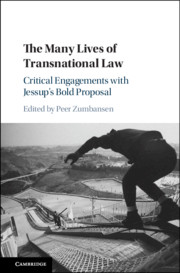Book contents
- Reviews
- The Many Lives of Transnational Law
- The Many Lives of Transnational Law
- Copyright page
- Contents
- Contributors
- Preface and Acknowledgements
- Introduction Transnational Law, with and beyond Jessup
- Part I Transnational Law
- Part II Transnational Law as Regulatory Governance
- Part III Transnational Law
- Part IV Conclusion
- Epilogue Difficulties for Every Solution
- Index of Names
- Subject Index
Epilogue - Difficulties for Every Solution
Defining Transnational Law at the Edge of Transdisciplinarity
from Part IV - Conclusion
Published online by Cambridge University Press: 18 March 2020
- Reviews
- The Many Lives of Transnational Law
- The Many Lives of Transnational Law
- Copyright page
- Contents
- Contributors
- Preface and Acknowledgements
- Introduction Transnational Law, with and beyond Jessup
- Part I Transnational Law
- Part II Transnational Law as Regulatory Governance
- Part III Transnational Law
- Part IV Conclusion
- Epilogue Difficulties for Every Solution
- Index of Names
- Subject Index
Summary
In 1956, Philip C. Jessup, in Transnational Law, defined transnational law (TL) as “all law which regulates actions or events that transcend national frontiers. Both public and private international law are included, as are other rules which do not wholly fit into such standard categories.” The book, defining the object of study, crystalized over the next generation as a field of study, if not quite yet a methodology and not yet a discipline. Philip Jessup’s definition of TL was formulated within the horizon of a particular phase of disciplinary engagement, which has been broadly characterized as postwar “pragmatism,” though this category hides as much as it reveals.3 The current book arrives at a different moment, and if future intellectual historians take us at our word, they will characterize us with a similarly imprecise term: interdisciplinary. This epilogue will diverge in its task from what the essays above have done so ably: investigating TL as an account of regulatory actors, norms, and processes discoverable in the world. It will open a window instead upon TL as a project for producing knowledge.4 This means viewing the book through the lens of its purposes, motives, and habits in producing TL as a kind of knowledge. It also means recognizing that the particular image of TL captured in the present book is highly specific, implicitly opposed to other conceptions, and that is true even if representatives of every faction are present and accounted for.
Keywords
- Type
- Chapter
- Information
- The Many Lives of Transnational LawCritical Engagements with Jessup's Bold Proposal, pp. 461 - 492Publisher: Cambridge University PressPrint publication year: 2020

